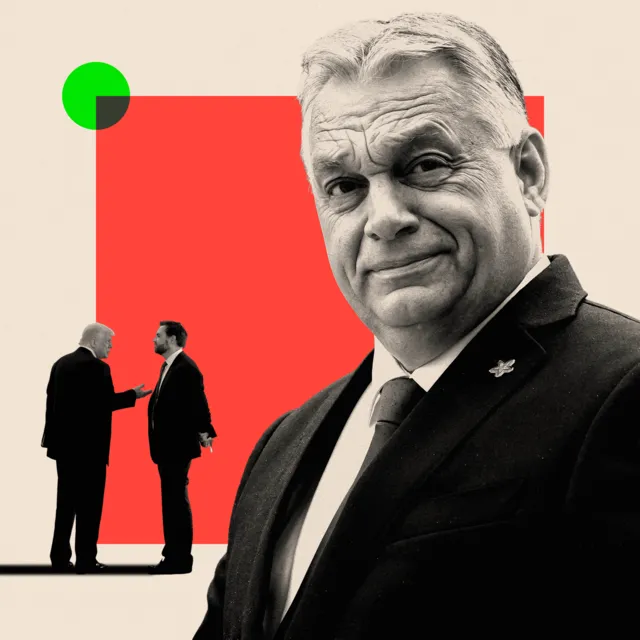Hungary’s Strongman Under Pressure: Viktor Orban’s Power Base Crumbles Amidst Rising Opposition
A Hungarian proverb, “Visszanyal a fagyi,” translates to “The ice-cream licks back,” a poignant reminder that actions can have unforeseen and potentially negative consequences. This age-old wisdom seems particularly relevant to Hungarian Prime Minister Viktor Orban, a leader who has cultivated an image as a formidable “strongman” and whose political playbook has inspired figures like former US President Donald Trump. For over two decades, Orban has championed an “illiberal democracy” and a vision of “Christian liberty,” reshaping Hungary’s political landscape. His assertive stance has garnered admiration from international allies, including US Deputy President JD Vance and Georgian Prime Minister Irakli Kobakhidze, with Trump himself praising Orban as “smart” and “a tough person.”
However, Orban’s carefully constructed image and policies are now facing significant challenges, not from the liberal left as one might expect, but from within the center-right and from a populace increasingly disillusioned with the state of the nation. A recent attempt to ban the annual Pride march in Budapest, a move that targeted the LGBTQ community, backfired spectacularly. Instead of stifling dissent, the ban galvanized hundreds of thousands of people, who took to the streets in a massive display of support for gay rights, free speech, and the right to assembly. This surge in participation, a significant increase from previous years, suggests a potential turning of the tide, where the very liberal values Orban has sought to suppress may indeed be “licking back.”
The most significant threat to Orban’s long-held power has emerged in the form of Peter Magyar, a 44-year-old former insider of Orban’s own Fidesz party. Magyar’s emergence as a challenger in February 2024 followed a major political scandal involving a presidential pardon for a man convicted of covering up child sexual abuse. This scandal led to the resignation of President Katalin Novak and Justice Minister Judit Varga (Magyar’s ex-wife), deeply impacting Orban’s purported commitment to traditional family values. Magyar has since been vocal, utilizing opposition media platforms to denounce the governing party’s alleged nepotism and corruption.
Magyar’s strategy appears to be one of careful positioning, aiming to consolidate support from the conservative base in rural Hungary, a demographic that has historically been loyal to Orban. He is painting a stark picture of a nation in decline, highlighting the deteriorating conditions in public hospitals, the state of the railway system, and the generally low wages in public service. Polls suggest a significant shift, with Magyar’s Tisza party gaining considerable ground, often polling second only to Fidesz, and in some cases even surpassing it. This growing support indicates that Orban’s long-established strategies, which have relied on identifying and exploiting public fears, may be losing their efficacy.
Orban’s political career, spanning 19 of the 35 years since the fall of Communism, is marked by a consistent strategy of nationalist rhetoric and a focus on perceived threats. He famously opposed migration in 2015, labeling asylum seekers as a threat, and has maintained a skeptical stance towards supporting Ukraine against Russian aggression. His electoral successes in 2010, 2014, 2018, and 2022 were built on these platforms. However, his recent maneuvering, such as supporting an ultra-nationalist candidate in Romania who ultimately lost, and his inability to prevent the Pride march, signal potential vulnerabilities.
The electoral system, reformed by Orban in 2011 to consolidate power, effectively created a “winner-takes-all” dynamic. This system, which reduced the number of parliamentary seats and eliminated run-off elections, has historically channeled votes to the dominant party, allowing Fidesz to secure a disproportionately large number of seats even with a smaller share of the vote. The appointment of loyal judges to key judicial bodies further solidified his grip on power.
Domestically, Orban’s government has faced criticism for the state of its public services, including hospitals, schools, and the national railway. Magyar’s campaign directly challenges the government on these issues, promising to rebuild the country “brick by brick.” This message resonates with a public weary of economic stagnation and declining living standards, exacerbated by Hungary’s reliance on the German economy and the automotive sector.
Internationally, Orban’s alignment with figures like Donald Trump and his critical stance on EU policies regarding Russia and migration have positioned him as a prominent voice for conservative and nationalist movements globally. He has cultivated an image of a defender of “Christian Europe” against perceived threats from liberalism and immigration. His ability to leverage international attention while navigating domestic challenges is a testament to his political acumen, yet the growing domestic opposition suggests his once-unshakeable grip may be loosening.
The upcoming election in April 2026 is seen by many as a critical juncture for Hungary. With polling data indicating a potential shift in public favor, the election is likely to be decided by undecided voters. Orban’s campaign may once again focus on themes of peace and national interest, particularly concerning the war in Ukraine and energy security, potentially portraying himself as a stabilizing force against a backdrop of global uncertainty. His relationship with Russian President Vladimir Putin, presented as a guarantee of affordable energy, remains a key element of his domestic appeal.
However, Magyar and his supporters are hopeful that Tisza can maintain its momentum, presenting a vision of democratic renewal and a departure from what they describe as Orban’s increasingly authoritarian rule. The coming months will be crucial in determining whether Orban’s playbook, honed over years of political dominance, can withstand the burgeoning challenge from a populace seeking change, or if Hungary is indeed heading towards a significant political transformation.

